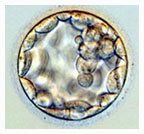 Part of the struggle in the stem cell debate is the definition of terms. The media regularly uses the term embryo to refer to what is necessarily destroyed to obtain embryonic stem cells. The more specific term is blastocyst. The blastocyst (see picture) forms after about 5-7 days following fertilization and ends at about 14 days when further differentiation begins.
Part of the struggle in the stem cell debate is the definition of terms. The media regularly uses the term embryo to refer to what is necessarily destroyed to obtain embryonic stem cells. The more specific term is blastocyst. The blastocyst (see picture) forms after about 5-7 days following fertilization and ends at about 14 days when further differentiation begins.
Medical thriller author Robin Cook in his latest book, Seizure, has one of his characters, a medical researcher Dr. Daniel Lowell, testify before Congress that “Blastocysts have a potential to form a viable embryo, but only if implanted in a uterus. In therapeutic cloning, they are never allowed to form embryos… Embryos are not involved in therapeutic cloning.” (p. 32) The clear implication is that blastocysts are not embryos. This sounds extremely disingenuous to me.
Cook further clarifies his personal opinion in the epilogue where he states, “Senator Butler [a predictably hypocritical, pompous pro-life senator–my comment], like other opponents of stem-cell and therapeutic cloning research, suggests that the procedure requires the dismemberment of embryos. As Daniel points out to no avail, this is false. The cloned stem-cells in therapeutic cloning are harvested from the blastocyst stage well before any embryo forms. The fact is that in therapeutic cloning, an embryo is never allowed to form and nothing is ever implanted into a uterus.” (p. 428) So if there are no embryos, there are no humans and there is no ethical debate. Cook is playing a semantic game. The character Daniel in the novel admits as much but says it is important semantics.
So I checked Scott Gilbert’s fifth edition of Developmental Biology (Sinauer Assoc. Inc.), 1997. On page three Gilbert says, “The study of animal development has traditionally been called embryology, referring to the fact that between fertilization and birth the developing organism is known as an embryo.” By this definition, Cook is far off base as I suspected.
But then I checked to see if Gilbert had a newer edition. Sure enough, I found one on Amazon.com. The year is not stated but I suspect it is at least 2002-2003. Not surprisingly, I suppose, the same definition of embryology is stated differently (some pages are available for viewing): “The study of animal development has traditionally been called embryology, from that phase of organisms that exists between fertilization and birth.” (p. 4) Note that the word “embryo” is omitted this time, yet the word “embryology” clearly means the study of embryos. So Gilbert tries to backpedal from the word embryo yet inadvertently defines embryo anyway by simply trying to define embryology at all. I wonder if Gilbert and Cook know each other. <smile> Note also that human embryonic stem cells were first harvested successfully from embryos left over in fertility clinics by researchers from the University of Wisconsin in 1998, one year after Gilbert’s 5th edition.
Even biologists are now learning how to manipulate the language to define things however it suits them politically.
© 2004 Probe Ministries